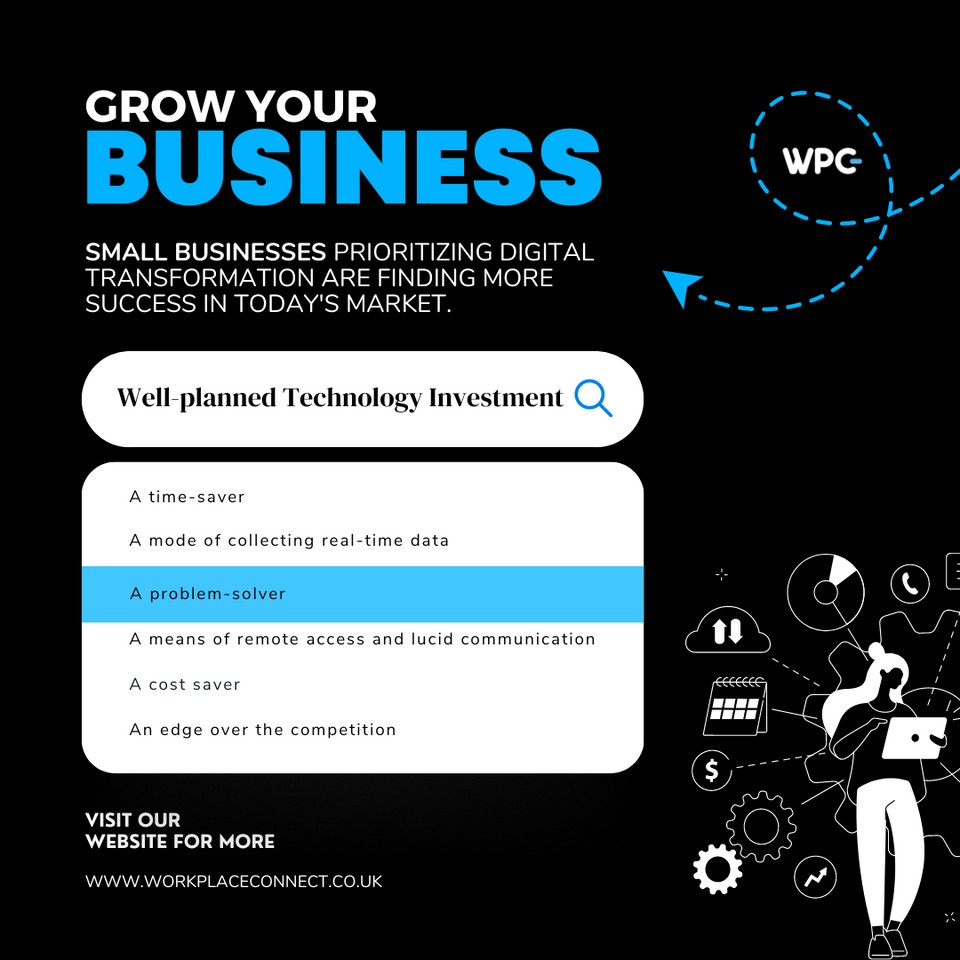In today’s economy, small businesses are more successful when they prioritize digital transformation. Since its debut in the industry, digital transformation has been assisting large organizations in scaling up by focusing on digitizing operations and optimizing internal processes. Digital transformation, on the other hand, might be “do or die” for small businesses. Depending on the wrong objectives might lead to significant losses because of the investment needed to shift a tech stack.
When it comes to contending with their more well-funded and established peers, smaller firms have little time to spend. These businesses need to pinpoint potential growth areas and figure out how to use technology to bolster human endeavors if they want to have a competitive advantage in the market.
But how does putting the correct technologies in place help? Why should you, as a company, invest in technology?
Modern Technology’s Significance in Business
Let’s look at the world as it is right now. Business technology is of utmost importance; it controls how businesses operate, how data is managed, and even how the staff interacts with clients. The cherry on top is that consumer purchasing behavior is likewise governed by company technology. In the era of digital transformation, a corporation could suffer significant failures if it is unable to recognize and embrace the all-pervasive, omnipotent role of technology.
Technology’s advancement has been effective in fostering innovation and significant advancements that have made life easier for people all around the world. Small enterprises can now contend with big players in the sector by making technology investments. It makes no difference if you are just starting off. By promoting your goods to a worldwide audience using digital technologies, you can raise brand recognition.
Here is a closer look at how technology solutions may support business goals.
A Well-planned Technology Investment For a Business Is –
1. A time-saver
When technology is incorporated into a business process, it instantly becomes more effective. By making technological investments, many labor-intensive processes can be mechanized, made simpler, or even eliminated. According to estimates, investing in technology can boost your company’s productivity by 20%.
2. A problem solver
Technology solutions are essential for analyzing pain spots and potential growth areas through data analysis and business intelligence software. The intelligent systems assist in gathering real-time data and provide the opportunity to examine the big and small information collected to improve the next business choice.
A problem can be predicted and an opportunity can be identified well in advance with the use of predictive data analytics. And in the unlikely event that a query does arise, AI-integrated apps instantly answer with built-in backup plans.
3. A method for clear communication and remote access
Every employee participating in the digital transformation process has a smartphone. It denotes constant connectedness at all times. Additionally, it implies that an employee can carry out his tasks while on the go and bring his job with him. According to research, employees who work remotely are 20% more productive and 13% more efficient because there are fewer interruptions. Thanks to the company’s timely investment in technology, workplace participation is also strongest among employees who have remote work options.
Small businesses have benefited from investments in technology by strengthening their communication operations. Improved customer communication is made possible by texts, emails, websites, applications, and other means. Companies can spread their message until the market is saturated by using a wide range of information technology communication techniques. Feedback obtained via these electronic communication channels is also very beneficial.
Interoffice communication is also facilitated by technological solutions. Employees have fast access to internal papers and contracts as well as a single site where they may update them using social intranet programs like Spark or Skype. They can also instantaneously forward pertinent information to the right department. Businesses may reach customers instantly via their handheld devices by using the same techniques.
4. A cost saver
Business owners can use technology to cut costs. A company can automate back-office tasks like payroll, bookkeeping, and record keeping by using enterprise software. Home offices are powered by mobile technology, and field representatives can communicate in real-time.
For instance, field representatives can remotely access the accounting system at the physical office. They can also log everyday expenses as they are incurred using mobile apps.
A Forbes article states the following:
- Companies claim that their connection with technology investment is ordinary or above average in around 77% of the cases.
- While 55% of businesses feel they will start losing market share in less than a year if they don’t undergo a digital transformation process.
5. A way of collecting real-time data
In this case, real-time is crucial. A corporation has information about a customer’s past behavior, such as what they did yesterday or the day before. It can use a lot more data to strengthen its strategy and make decisions on what the client will do tomorrow.
It is advised to use a customer data platform that offers a consolidated picture of all the information gathered and interaction data to make gathering and analyzing real-time data from various sources simpler.
6. An advantage over the competition
Technology investment is now a key tool in growing a firm, not only a technique to get an edge over a rival. Sears cut the time it took to launch marketing campaigns from 8 weeks to 1 week by using data it collected through technology. When encrypted messaging apps were adopted as the preferred form of communication in hospitals, the number of patient stays decreased by 14%.
Businesses that switched from PSTN to VoIP had annual employee productivity savings of £745K. These are just a few benefits that a business might receive from investing in technology.
Top 3 Reasons – Why Digital Transformation?
1. Technology improves business
After implementing a cloud computing solution like SaaS, 40% of businesses claim increased agility, flexibility, and responsiveness. The use of cloud computing can be used to assess a company’s exposure to technology.
The contemporary generation aspires to success and desires to work for themselves. They are aware of how technology and the digital revolution are the new flames for humanity. Their following technological investments have fuelled a disruptive force in the sector.
Small and medium-sized businesses now have better access to software design, business applications, and another roadmap for digital transformation than the options used by large organizations two decades ago.
2. Technology is WORTH it.
The very first thing that springs to mind when executing a technology plan is investing a lot of money. However, the cost of investing in digital transformation is worthwhile. The expense of technology was recently broken down in a Forbes article in comparison to other company operations. Think about the cost of an internal team versus an outsourced project. An experienced employee costs about £50 per hour, while a workplace costs £2 per hour. Let’s compare it to the software development staff working remotely who is now creating and implementing your software strategy.
At just £0.20 per hour, new software design with a professional working on a computer that supports the most recent technological advancements without any hiccups or latency is far less expensive. It is worthwhile to spend a few pennies per hour on technologies that can help you reach more people.
3. Better customer relationships are made possible by technology.
Enhancing client loyalty is one of all businesses’ top priorities when it comes to dealing with customers. In addition to rule number one, which is to provide high-quality goods and services, a company must respond quickly to client inquiries.
In order to make it simpler for companies to provide customer support, new technologies have entered the market. The number of ways that businesses communicate with their consumers and markets has expanded, as has the amount of specificity in those relationships.
Analytics and data management are crucial. Customers’ information is gathered to examine their preferences. Future market/customer insights generated from this data are used to boost the potency of targeted marketing. 40% of companies claim that using cloud computing has improved their agility and responsiveness.
How Might Digital Transformation Help Scale Your Own Business?
Technology development is one of the best ways to expand a firm and has the capacity to handle even the most complex business processes. One of the cutting-edge technological trends, digitalization automates many business model operational activities while handling business operations successfully. The people’s demand was growing over time, and the conventional ways took a lot of time. This compelled companies to consider technical alternatives as a result. Digitalization was not intended to be a replacement for conventional methods. However, it emerged as a crucial component that automates some corporate operations and gets rid of some others, boosting productivity.
Small businesses may make more effective, data-driven decisions and accelerate their team’s productivity faster than ever before by utilizing the proper research and selecting tactics.
Effective digital transformation help you in a lot of areas, which will greatly aid you in successfully growing your business.







